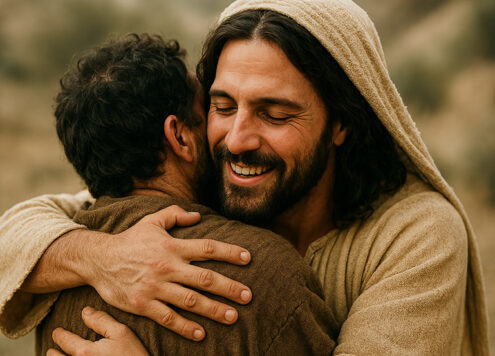—Gospel of Luke, chapter 14 : 26
Jesus commands us to “Love one another; even as I have loved you” (John 13:34). He did not come to destroy what is in the Old Testament but to fulfill it. (Matthew 5:17) The fourth commandment obligates us to ” honor your father and your mother.” (Exodus 20:12) Now we read in Luke 14:26 that “If anyone comes to me and does not hate his father and mother, wife and children, brothers and sisters; yes, and even life itself, he cannot be my disciple.” How do we reconcile these seemingly contradictory demands of the scriptures? How can we “hate” those we are commanded to “love”? You could argue that St. Luke’s manner of speaking is not to be interpreted literally, but that he was pointing out the paradox of discipleship that puts the following of Christ above ties of blood.
Putting the love of Christ above ties of blood was reported in the media some time ago when a young girl tearfully turned her parents over to the police so that they could be cured of their drug addiction. That was a very courageous move on the part of the young girl. She loved her parents so much that she didn’t want to see them destroy their lives. So, she went to the police to help them. Similarly, we are bound to love our parents and family members and everyone else, but we are not bound to accept or follow bad example.
From the time that Jesus spoke these words in Luke 14:26, they have been considered among the ‘Hard Sayings’ of Jesus, those considered difficult to understand or follow. Some Christians prefer to ignore these words because they don’t know how to explain them in context or they feel threatened by them. A Jewish friend of mine was very critical of these words of Christ, but when I explained to him the context and meaning behind these words, he dropped his criticism. Jesus leaves us in no doubt, however, about what he is saying: true discipleship is the ultimate challenge, and it demands renouncing family ties, if necessary, in order to follow Him.
But, there is another and more compelling way of interpreting Jesus’s words in Luke 14:26. An important rule of biblical interpretation is that scripture interprets scripture. In other words, whenever you come across a difficult passage in Scripture, look to another passage on the same subject that will explain it. The Bible cannot contradict itself because it is a unified whole with the Holy Spirit as the author.
Fortunately, there is another passage in which Jesus speaks on the same subject, and which clarifies Luke’s use of the word HATE. It is in Matthew, chapter 10:37 where the word LOVE replaces the word hate: “Whoever loves his father or mother more than me is not fit to be my disciple.” We are to love our parents, ourselves, and life itself, but we should never love anyone more than Jesus. To love anyone more than Jesus would be to elevate the creature above the Creator.
Jesus is pointing out the cost of following Him in both Luke 14:26; and in Matthew 10:37. We will be put in situations where your own blood relations will try to drag you down and away from the Lord. This is why Jesus says, “Do you think I have come to bring peace on earth? No, I tell you, I have come to bring division. From now on, in one house, there will be five divided, three against two and two against three.” (Luke 12:51-52).
This scripture message might appear negative at first, as my Jewish friend initially thought. On the contrary, it is a positive message that is meant to show us how radical is Jesus’s message of love.
The life of a genuine Christian is an incredible, life-changing challenge based on following Jesus.
—Fr. Hugh Duffy











1 Comments
Brian J. McShane
Great job again Fr. Duffy! You stories & lessons are just what we need to hear today! God bless you!